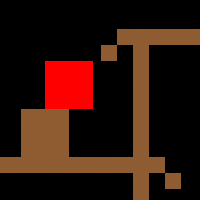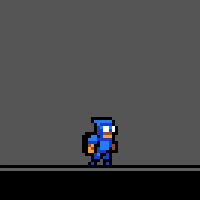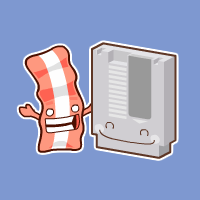 Recently, Adam Saltsman (Canabalt) released a bunch of game prototypes he’d been working on. They are each at various stages of completion, but they’re all worth having a look at. You can play them here.
Recently, Adam Saltsman (Canabalt) released a bunch of game prototypes he’d been working on. They are each at various stages of completion, but they’re all worth having a look at. You can play them here.
I think it’s great that Adam has decided to share these with everyone. Prototyping is an important part of the game design process. Unfortunately, it’s also a part of the process that is often skipped (myself included). Adam typically creates game with very simple mechanics and as a result it’s easy to assume he might be skipping the prototyping phase. But as you can see, even a minimalistic designer like Adam Saltsman takes time to prototype.
Prototyping…
- helps you find out if your concept is fun before you spend time making final art
- allows you to figure out how you’re going to use assets before you get into final art. In whipping up placeholder art you might find that you prefer nested clips to having all your animation on one clip’s timeline, for example. It’s better to find that out before you create your art than having to go back and change it.
- induces flexibility. When you’re working with placeholders and are rapidly prototyping, you’re not worrying about holding yourself to using art assets you’ve already created. Sometimes it’s hard to let go of stuff you’ve spent time on which can inadvertently lock you into concepts that really aren’t that important. You’ll find that you will code with more agility when you’re prototyping.
- makes it easier to try out new things. I find that if I’m working towards a final productI’m worry about all sorts of additional stuff that’s unrelated to game mechanics; menus, game restart, transitions between game states, etc. When I’m prototyping I don’t build any of those things, so I’m free to just throw down a bunch of stuff, try it out and not have to worry about how or if it relates to any of the “non-gameplay stuff”.
 On another note, I think it’s great to see some of the well known and successful game developers sharing their unpolished work. With thousands of people creating new games every week, we end up seeing primarily the best of the best… it’s all we have time for. As a result, it’s easy for budding game developers to get the impression that there are people out there who do nothing but have great ideas and crap out steaming piles of awesome. I think, particularly for young game developers, that there’s great value in having the curtain pulled back.
On another note, I think it’s great to see some of the well known and successful game developers sharing their unpolished work. With thousands of people creating new games every week, we end up seeing primarily the best of the best… it’s all we have time for. As a result, it’s easy for budding game developers to get the impression that there are people out there who do nothing but have great ideas and crap out steaming piles of awesome. I think, particularly for young game developers, that there’s great value in having the curtain pulled back.
No-one gets a game right the first time.
Everyone has to work at it.
Having to revise your work, scrap ideas and change code is NOT a sign a failure it’s a part of the process that you’re not only expected to encounter but should be planning on doing.
